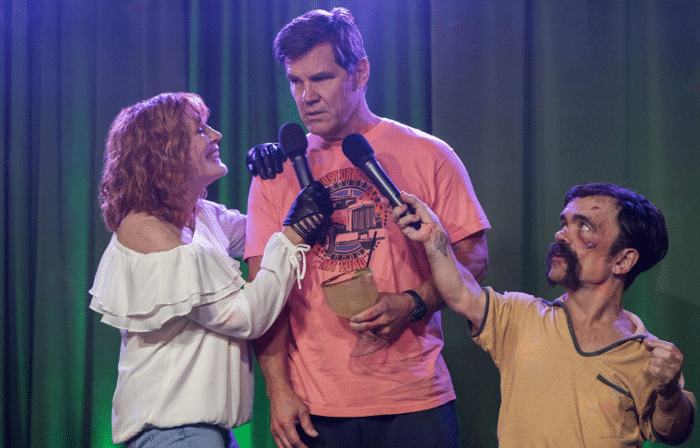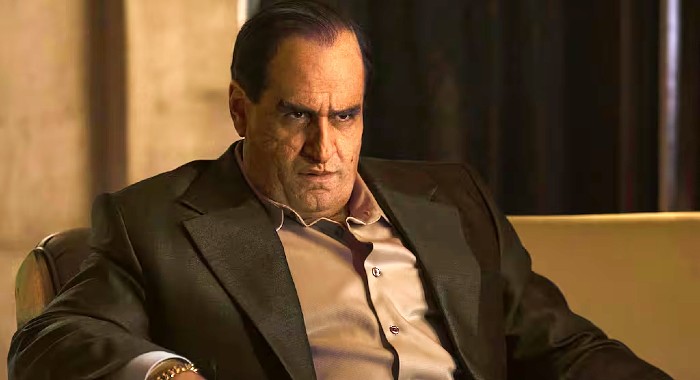

Reflecting on the Ending of 'The OA' and the Gap Between What We Know and What We Feel
By Genevieve Burgess | Streaming | December 20, 2016 |
By Genevieve Burgess | Streaming | December 20, 2016 |
The OA was a strange and ambitious show from start to finish. It had a deeply philosophical exploration of the nature of life and death, the meaning of compassion, and how extraordinary situations can bring people together and change them. It also had enormous respect and empathy for its characters, most of whom were never reduced to base stereotypes but shown to be full, complex, frequently frustrating human beings. And at the end, it left the audience hanging on a lot of questions. Truthfully, I don’t think it had any other option.
What happened to Nina/Prarie/The OA? What we know for sure, the things that were confirmed by other characters, is that she was adopted as a girl from a sketchy Russian baby-peddler. She was blind. She spent most of her childhood and adolescence heavily medicated for disturbing dreams and beliefs. She left because she was convinced she would find her father and was missing for 7 years. When she reappeared she was wearing the same dress she went missing in, and she could see. She has scars on her back, possibly self-inflicted. She was held underground for long enough that her medical tests showed a serious vitamin D deficiency. That is what we know about her for sure.
The rest of her story is extremely questionable. We don’t know the veracity of her “prophetic” dreams because we can’t verify the bus accident she describes as a child and her father never met her in New York. But her dream did prompt her to arrive at the high school at exactly the right time. The “movements” she describes creating with her fellow captives and that she teaches to her group likely do not have any power in and of themselves and almost certainly did not raise the dead. But they apparently kept her alive and thriving while she was being held, and it gave her new group courage under fire. It gave them connections to each other they never would have had otherwise. It gave them a purpose that seemed absent in their lives. Can we call that a kind of supernatural power? Put under a lens, it’s not that far divorced from most organized religion; she promised to teach them the secret of what’s beyond life, she formalized their meetings, and she gave them a sort of physical “prayer” to invoke a higher power. A prayer the group used to literally face down death without fear. Was it a cult? Or just a troubled woman seeking solace and understanding in others, as her psychologist told French? Does it matter?
Brit Marling’s work with both Mike Cahill in Another Earth and Zal Batmanglij in The East and Sound of My Voice has explored a lot of these themes before. What is the nature and purpose of compassion? How much should you trust the unverifiable, and does it matter when its effect is a net positive? When do you become part of something larger than yourself? What do you lose in the process and what do you give up willingly? These are questions that ultimately will not have an answer that can be shown on screen. They are highly personal. The answers will be different for all of us. It is in the asking and considering that we find the worth of the questions and expand our understanding of ourselves and others.
Did interpretive dance save the world? No. The show made that quite clear. That “prayer” gave the five members of OA’s group the courage to confront their greatest fear, but they were not the ones who neutralized the threat. If OA did transport to another dimension after the incident, she did so through death. Is that an inter-dimensional passage? I don’t know. We can’t know. But believing so, in one fashion or another, has given hope to billions of people throughout history and around the world in their darkest moments. Faith is what we have when we don’t have answers, and for all the technological advancements and scientific achievements we have made there is still a point where we need faith to bridge the gap between what we know and what we feel. That is what The OA was about, and in that I feel it was ultimately successful.
← Richard Marx Subdues Passenger on Korean Airlines | A Very Reproductive Rights Horror Show Edition of Pajiba Love →
More Like This
Streaming Platforms Give Shows like 'Evil' The Room To Be Horny And Weird And We Love It
Spoilers: Netflix’s Korean Comedy 'Chicken Nugget' Is Getting Review-Bombed Over A Single Joke
How 'X-Men '97' Sidestepped Cyclops' Biggest Sin And Redeemed A Tragic Foe
Prime Video's Commercial Breaks Suck
New to Netflix: Kristen Bell's 'Queenpins'

Three Trailers: Polymorphic Pattinsons Vs. Bonkers 'Brothers' Brolin and Dinklage
A New Series Explores the ‘Chaos’ Behind Superhero Franchises
Robert De Niro Couldn't Remember His Lines While Shooting 'Joker'
RFK, Jr. Had an Affair with 31-Year-Old Journalist, Olivia Nuzzi
‘We Live In Time’ Inspired Florence Pugh to Prioritize Her Love Life
Elle King Says Rob Schneider's Apology 'Means Nothing'
Pajiba Love

Where Were You When You Learned About The Penguin's Dong?
Reviews